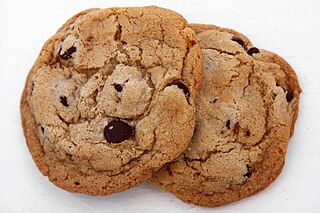
A cookie or biscuit is a baked snack or dessert that is typically small, flat, and sweet. It usually contains flour, sugar, egg, and some type of oil, fat, or butter. It may include other ingredients such as raisins, oats, chocolate chips, or nuts.

Nabisco is an American manufacturer of cookies and snacks headquartered in East Hanover, New Jersey. The company is a subsidiary of Illinois-based Mondelēz International.

Newtons are a Nabisco-trademarked version of a cookie filled with sweet fruit paste. "Fig Newtons" are the most popular variety. They are produced by an extrusion process. Their distinctive shape is a characteristic that has been adopted by competitors, including generic fig bars sold in many markets.

Hardtack is a type of dense cracker made from flour, water, and sometimes salt. Hardtack is inexpensive and long-lasting. It is used for sustenance in the absence of perishable foods, commonly during long sea voyages, land migrations, and military campaigns. Along with salt pork and corned beef, hardtack was a standard ration for many militaries and navies from the 17th to the early 20th centuries.
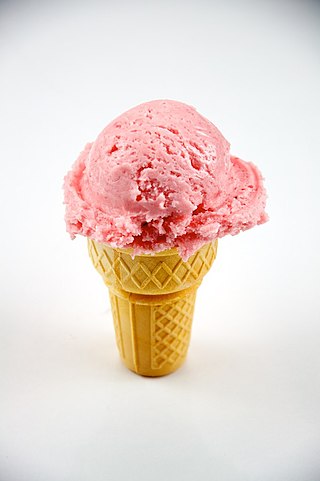
An ice cream cone (England) or poke (Ireland/Scotland) is a brittle, cone-shaped pastry, usually made of a wafer similar in texture to a waffle, made so ice cream can be carried and eaten without a bowl or spoon. Many styles of cones are made, including pretzel cones, sugar-coated and chocolate-coated cones. The term ice cream cone can also refer, informally, to the cone with one or more scoops of ice cream on top.
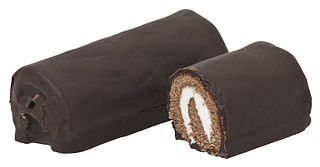
Drake's is a brand of American baked goods. The company was founded by Newman E. Drake in 1896 in Harlem, New York, as The N.E. Drake Baking Company, but it is now owned by McKee Foods. The company makes snack cake products such as Devil Dogs, Funny Bones, Coffee Cakes, Ring Dings, and Yodels. Drake's has traditionally been marketed primarily in the Northeastern U.S., but it expanded to the Mid-Atlantic and Southeastern U.S. regions in 2016. The products are made under the Orthodox Union kosher certification guidelines.

Carr's is a British biscuit and cracker manufacturer, currently owned by Pladis Global through its subsidiary United Biscuits. The company was founded in 1831 by Jonathan Dodgson Carr and is marketed in the United States by Kellogg's.
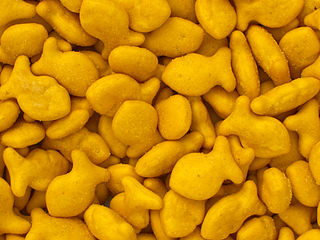
Goldfish is a brand of fish-shaped cracker with a small imprint of an eye and a smile manufactured by Pepperidge Farm, which is a division of the Campbell Soup Company. The brand's current marketing and product packaging incorporate this feature of the product: "The Snack That Smiles Back! Goldfish!", reinforced by Finn, the smiling goldfish mascot with sunglasses. The product is marketed as a "baked snack cracker" on the label with various flavors and varieties.

Sunshine Biscuits, formerly known as The Loose-Wiles Biscuit Company, was an independent American baker of cookies, crackers, and cereals. The company, which became a brand on a few products such as Cheez-It, was purchased by Keebler Company in 1996, which was purchased by Kellogg Company in 2001. Around then, Sunshine Biscuits was headquartered in Elmhurst, Illinois, where Keebler was located until 2001.

Shredded wheat is a breakfast cereal made from whole wheat formed into pillow-shaped biscuits. It is commonly available in three sizes: original, bite-sized and miniature. Both smaller sizes are available in a frosted variety, which has one side coated with sugar and usually gelatin. Some manufacturers have produced "filled" versions of the bite-size cereal containing a raisin at the center, or apricot, blueberry, raspberry, cherry, cranberry or golden syrup filling.

A saltine or soda cracker is a thin, usually square, cracker, made from white flour, sometimes yeast, and baking soda, with most varieties lightly sprinkled with coarse salt. It has perforations over its surface, as well as a distinctively dry and crisp texture.
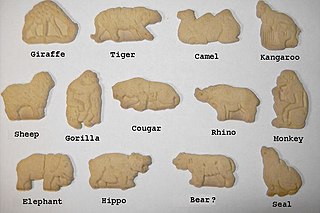
An animal cracker is a particular type of cracker, baked in the shape of an animal, usually an animal either at a zoo or a circus, such as a lion, a tiger, a bear, or an elephant. The most common variety is light-colored and slightly sweet, but darker chocolate-flavored and colorful frosted varieties are also sold. Although animal crackers tend to be sweet in flavor like cookies, they are made with a layered dough like crackers and are marketed as crackers and not cookies.
George Weston Limited, often referred to as Weston or Weston's, is a Canadian holding company. Founded by George Weston in 1882, the company today consists of the Choice Properties real estate investment trust and Loblaw Companies Limited, Canada's largest supermarket retailer, in which it maintains a controlling interest. The company is majority owned by Wittington Investments, Ltd Canada, a holding company that the Weston family are the controlling share holders in. Retail brands include President's Choice, No Name and Joe Fresh. The former Weston Bakeries division, which owned the brands Wonder, Country Harvest, D'Italiano, Ready Bake and Gadoua, was sold off to FGF Brands in 2022.

Farley's & Sathers Candy Company was created as an umbrella company to roll up many small companies, brands and products under a common management team. The confectionery business segment is made up of many small companies, often with intertwined relationships and histories.
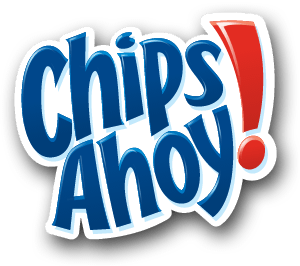
Chips Ahoy! is an American chocolate chip cookie brand, baked and marketed by Nabisco, a subsidiary of Mondelez International, that debuted in 1963. Chips Ahoy! cookies are available in different variations such as, original, reduced-fat, chunky, chewy, and candy-blasts; each can be identified by variations in the color of the package. For example, Chips Ahoy! original has blue color packaging, while Chips Ahoy chewy has a red packaging.
Kellogg Co. v. National Biscuit Co., 305 U.S. 111 (1938), is a United States Supreme Court case in which the Court ruled that the Kellogg Company was not violating any trademark or unfair competition laws when it manufactured its own Shredded Wheat breakfast cereal, which had originally been invented by the National Biscuit Company. Kellogg's version of the product was of an essentially identical shape, and was also marketed as "Shredded Wheat"; but Nabisco's patents had expired, and its trademark application for the term "Shredded Wheat" had been turned down as a descriptive, non-trademarkable term.

The Pacific Coast Biscuit Company Building is a building located in northwest Portland, Oregon, listed on the National Register of Historic Places. The building originally housed the Portland Cracker Company and later was home to the Pacific Coast Biscuit Company.

Adolphus Williamson Green was an American attorney and businessman. He was the co-founder of the National Biscuit Company in 1898. A year later, in 1899, he was the first person to sell packaged biscuits. He served as the President of the National Biscuit Company from 1905 to 1917.
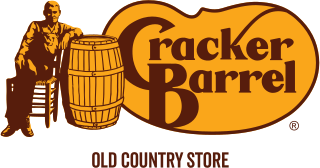
Cracker Barrel Old Country Store, Inc., trading as Cracker Barrel, is an American chain of restaurant and gift stores with a Southern country theme. The company's headquarters are in Lebanon, Tennessee, where Cracker Barrel was founded by Dan Evins and Tommy Lowe in 1969. The chain's early locations were positioned near Interstate Highway exits in the Southeastern and Midwestern United States, but expanded across the country during the 1990s and 2000s. As of August 10, 2023, the company operates 660 stores in 45 states.


















